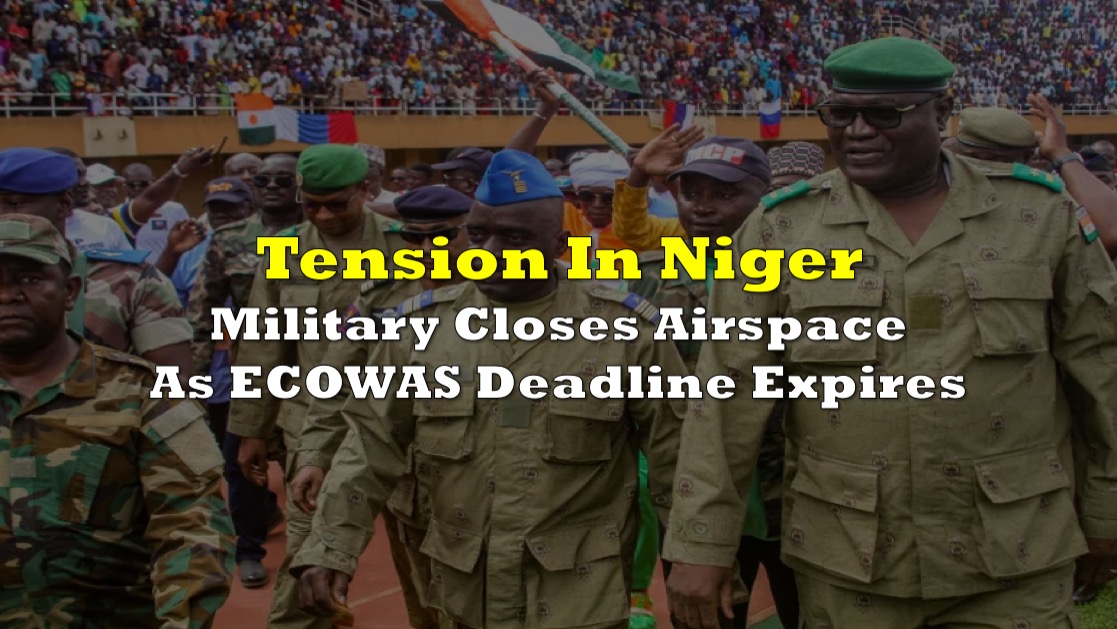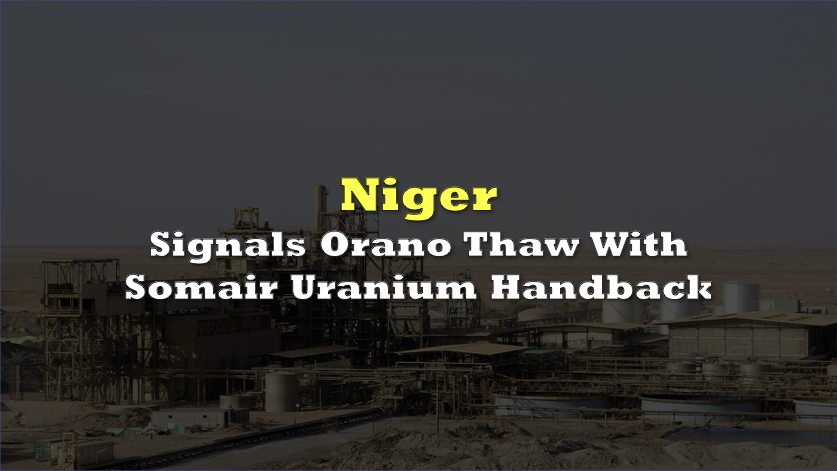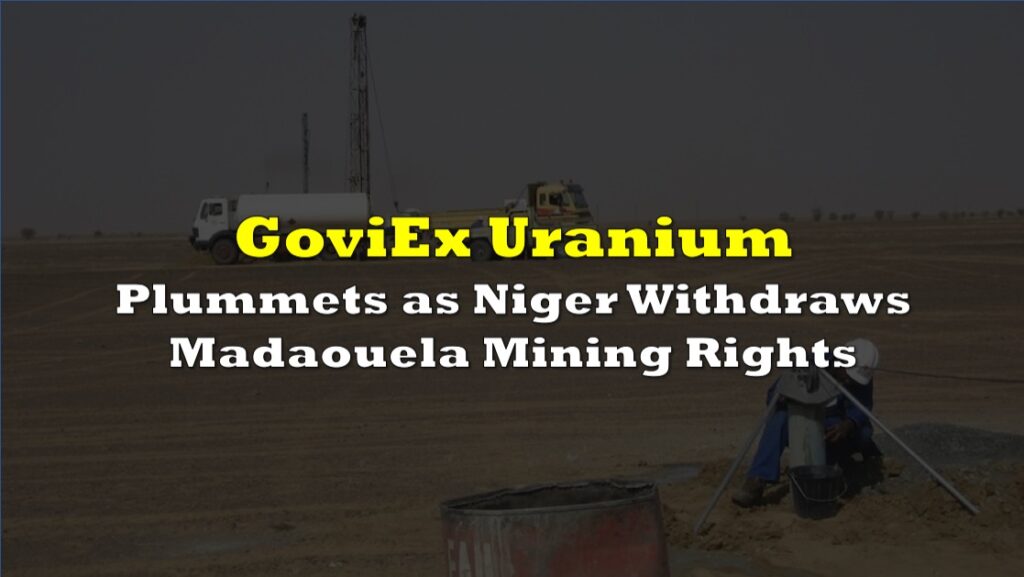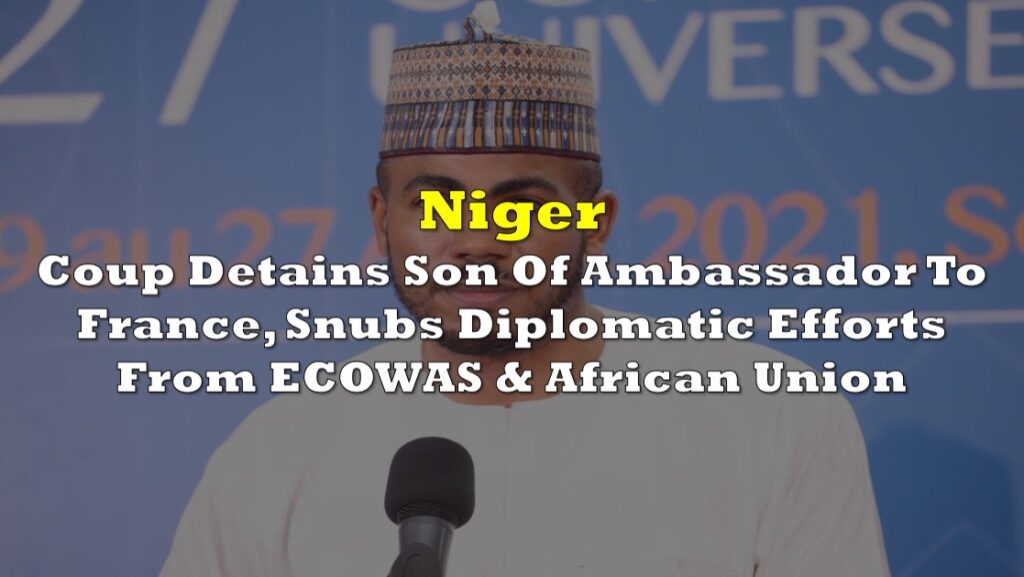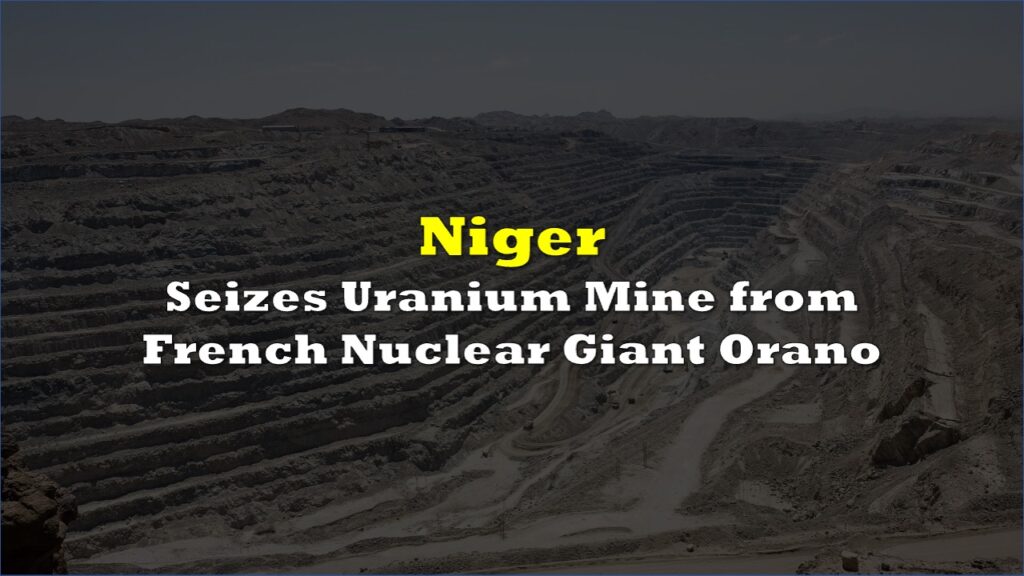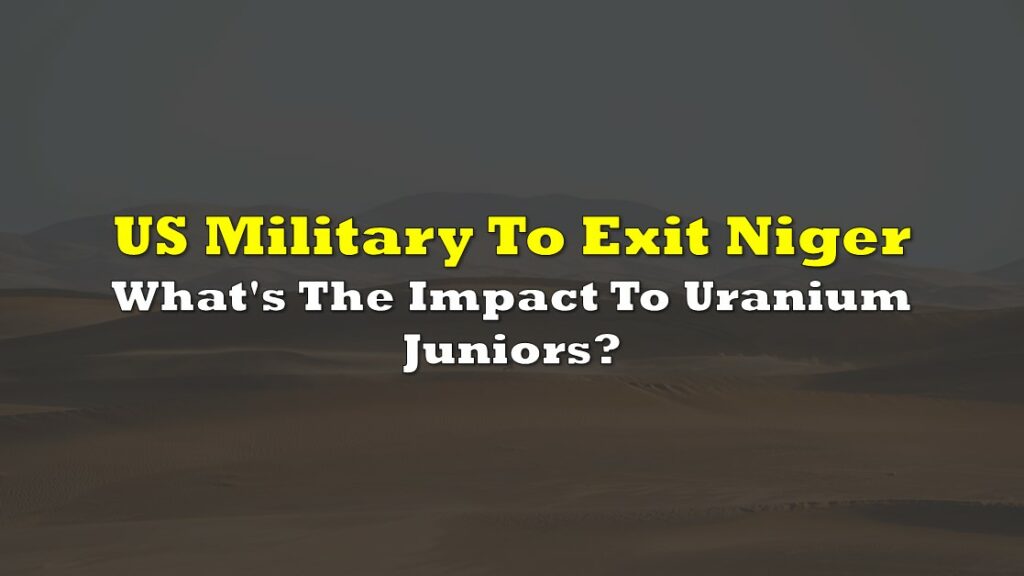Niger’s coup leaders have escalated the country’s political crisis by ordering the closure of its airspace, following their rejection of a West African ultimatum to reinstate ousted President Mohamed Bazoum or face potential military intervention.
Late on Sunday, amid a backdrop of tens of thousands of coup supporters gathering at a Niamey stadium to rally behind the generals of the National Council for the Safeguard of the Homeland (CNSP), the decision to shut down the airspace was announced. The move was justified by Amadou Abdramane, the CNSP spokesperson, citing the looming threat of intervention from the Economic Community of West African States (ECOWAS).
The #ECOWAS deadline for reinstating Niger's President and restoring the constitution has now passed.
— War Mapper (@War_Mapper) August 7, 2023
As the deadline expired, #Niger closed its airspace.
ECOWAS defence chiefs have drafted military intervention plans, pending final agreement on implementation and timing. pic.twitter.com/1YFbmdodiY
In a televised statement, Abdramane highlighted that forces had been pre-deployed in Central African nations, although specifics remained undisclosed.
“In the face of the threat of intervention, which is becoming clearer through the preparation of neighbouring countries, Niger’s airspace is closed from this day on Sunday … for all aircraft until further notice,” he said. “Niger’s armed forces and all our defence and security forces, backed by the unfailing support of our people, are ready to defend the integrity of our territory.”
CNSP of Niger calls on the people to be ready to defend the "homeland"
— Kirby (@IntelKirby) August 7, 2023
The U.S. Federal Aviation Administration has issued a Notice to Airmen (NOTAM) declaring the closure of Niger’s airspace for all flights until further notice.
The U.S. Federal Aviation Administration has just released a Notice to Air Missions or (NOTAM) for Niger’s Airspace stating that it is now Closed for All Flights until further notice. pic.twitter.com/WsDquzq4N3
— OSINTdefender (@sentdefender) August 6, 2023
The coup, which took place on July 26, marks the seventh such incident in West and Central Africa over three years. This crisis has shaken the Sahel region of Africa, a struggling area grappling with armed extremist groups linked to al-Qaeda and ISIS, further exacerbating its already dire socioeconomic conditions.
ECOWAS has unequivocally condemned the coup, enforcing stringent economic and travel sanctions, including the suspension of Niger’s power supply. The defense leaders within the bloc have formulated a potential military action plan, outlining the conditions for intervention if the detained leader is not released and reinstated by the stipulated Sunday deadline.
The deadline anxiety
As the Sunday deadline looms, West African nations find themselves at a crossroads, hastily deciding on their stance. ECOWAS’s resolute response to the Niger coup also exposes hitherto unseen fissures within the alliance of its 15 member states. As the specter of a regional conflict looms large, countries are hastily aligning themselves in what appears to be an imminent showdown. On one side stands the economically prosperous coastal nations, while on the other side lie their landlocked counterparts governed by military regimes.
Nigeria, Senegal, and Ivory Coast have expressed willingness to dispatch troops, with Nigeria’s Senate, however, urging for alternative options to military force. Nigeria, which is likely to contribute a substantial portion of the troops, witnesses a growing chorus of dissent against military involvement. Nigeria and Niger share not only geographical proximity but also close ethnic and historical ties.
Tensions are palpable in Sokoto, a northern Nigerian city adjoining Niger and home to the 8th Division of the army. Positioned at a crucial crossroads leading to Niger, Sokoto may serve as a gathering point for troops prior to any military operation. Despite the apparent tranquility of Sokoto’s residential neighborhoods, the specter of heightened anxiety looms over the city and its broader north-western state.
Sokoto’s suburb, Sabon-Gari Girafshi, predominantly inhabited by Nigerien residents, apprehensively anticipates the potential fallout of ECOWAS military intervention. Concerns abound that such actions could disrupt family members in Niger and compromise personal security in Nigeria.
ECOWAS military chiefs have developed a plan for possible intervention, but the bloc remains committed to diplomatic avenues. In addition to sanctions and border closures, Nigeria has suspended electricity supplies to Niger, impacting the border region.
One affected town is Illela, 80km from Sokoto city, which grapples with the economic strain of the border closure. Stranded truck drivers and business owners convey the far-reaching consequences of the crisis.
Simultaneously, Burkina Faso and Mali, both under military-backed regimes, have cautioned that any intervention in Niger would be tantamount to a declaration of war against them. Algeria, sharing a substantial land border with Niger, has voiced its reservations about a military solution.
⚡ Opportunistic infections are taking advantage of the Chaos caused by the Russians in the country of Niger. What a mess. pic.twitter.com/aSEoVPUdFZ
— Astraia intel 🇺🇦 (@astraiaintel) August 7, 2023
Retired Colonel Festus Aboagye, a security consultant to the African Union and the United Nations, emphasized the significance of Nigeria’s role in the region. He noted that Nigeria’s involvement is pivotal, recalling past ECOWAS interventions.
“The political timelines would be completely different from the military timelines. So what the politicians have stated, that is the ultimatum that lapses today, is not necessarily the D-day or the day that the military initiates hostilities,” he said.
Deadline passes
The deadline lapsed on Sunday. As evening descended, signs of a military intervention in Niger remained conspicuously absent.
While some experts suggest that the bloc’s uncompromising stance may have been influenced by Western allies—particularly the United States and France—ECOWAS’s strategy is, in fact, indicative of a novel approach under its new chair, Nigerian President Bola Tinubu. This shift encapsulates the anxieties of member-state leaders who are wary of potential insubordination within their own armed forces, analysts contend.
West African leaders have drawn a direct link between the surge in military takeovers and the escalating activities of armed groups. Oumar Touray, president of the ECOWAS Commission, remarked in July that the series of coups “parallel the insecurity that West Africa and the Sahel have been grappling with for some time.”
In contrast, Niger—the last bastion of French and US support in the Sahel—has managed to reduce attack-related fatalities by over 50% in recent years. This achievement can be attributed to dialogue with armed groups, engagement with conflict-affected communities, and collaboration with French and US forces, according to James Barnett of the Hudson Institute, a US-based think tank.
However, the new military leadership in Niger seems poised to deviate from this strategy. Barnett notes that the termination of the defense agreement with France has already been announced. While the involvement of the Wagner Group remains uncertain, the risk looms if ECOWAS proceeds with its intervention plans, and the Niamey junta seeks external support.
ECOWAS has a history of military interventions aimed at restoring stability. The regional force ECOMOG played a pivotal role in ending the civil wars in Sierra Leone and Liberia during the 1990s. In 2017, the alliance facilitated the exit of former Gambian autocrat Yahya Jammeh, who refused to relinquish power following an election defeat.
Nonetheless, Niger represents ECOWAS’s most formidable challenge in three decades, experts contend. This juncture is marked by pronounced regional divisions, as Barnett underscores. The situation is fraught, with the potential for a protracted and complex conflict.
Niger’s western neighbor, Chad, though not a formal member of the regional bloc, has assumed a mediation role. However, Chad has yet to commit to military action.
Defense chiefs have underscored that an invasion would be a last resort, but the bloc may persist with its unwavering approach. Tinubu, at the helm of ECOWAS, harbors ambitions of restoring Nigeria’s status as a regional superpower, a motivation that Barnett identifies. France has signaled its support for the bloc’s ultimatum.
However, Nigeria’s military is already grappling with internal crises, and the outbreak of war could disrupt joint counterterrorism operations in the region. Complicating matters, Niger is geographically situated above Nigeria, sharing a 1,600km (1,000 mile) border that could witness the spillover of hostilities into neighboring nations.
The French connection
The international community is divided on intervention, with France, Niger’s former colonial ruler, pledging firm support for ECOWAS actions post-deadline, without specifying military involvement. Russia has openly opposed military intervention while offering the services of its Wagner mercenary group, which has already gained influence in Mali and the Central African Republic.
France has also halted its provision of development aid and budgetary support to Burkina Faso indefinitely. Concurrently, the military junta in Niger has announced that ECOWAS has finalized its intervention strategies, with two West African nations initiating the preliminary deployment of their military forces.
#BREAKING France suspends, until further notice, all its development aid and budget support to Burkina Faso.
— Clash Report (@clashreport) August 6, 2023
Meanwhile Niger’s military junta says ECOWAS has completed its intervention plans and that two West African countries have begun the pre-deployment of their troops.
The French Ministry of Foreign Affairs seems to know something that we don’t… https://t.co/JobhzCwi06
— OSINTdefender (@sentdefender) August 6, 2023
— Evergreen Intel (@vcdgf555) August 7, 2023
Against this backdrop, a massive rally unfolded in Niamey, where crowds congregated at a stadium adorned with Russian flags, celebrating the coup leaders. General Mohamed Toumba, a CNSP leader, addressed the gathering, denouncing hidden adversaries plotting subversion.
“We are aware of their Machiavellian plan,” he said. The crowd’s chants denounced ECOWAS sanctions and criticized France’s role.
Despite growing tensions and international divisions, coup supporters exhibited unwavering resolve. In Niamey’s Boukoki neighborhood, residents echoed this sentiment, declaring their readiness to protect their nation in the face of adversity.
“We’re going to fight for this revolution. We’re not going to retreat faced with the enemy, we’re determined,” said pensioner Adama Oumarou who’s one of those standing with the coup plotters. “We have been waiting for this coup for a long time.”
Information for this story was found via AlJazeera, BBC, and the sources mentioned. The author has no securities or affiliations related to the organizations discussed. Not a recommendation to buy or sell. Always do additional research and consult a professional before purchasing a security. The author holds no licenses.

